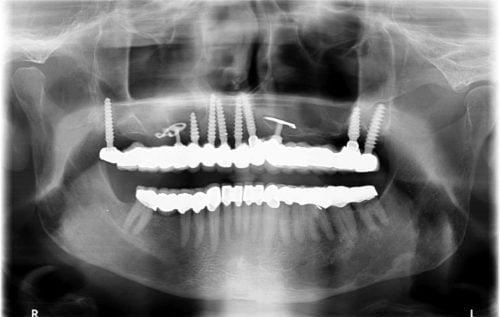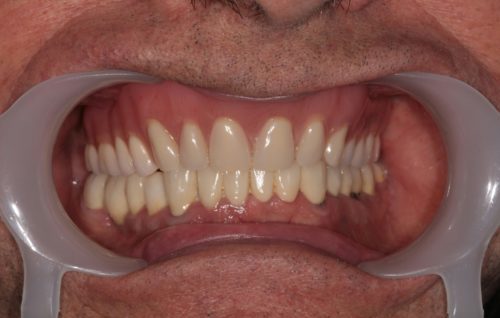Dental Implant Failure & Peri-Implantitis
Expert team and advanced techniques help provide the best possible outcomes

Expert team and advanced techniques help provide the best possible outcomes
At one80 Dental we have a reputation for finding solutions using dental implants. Even in complicated cases we have an impressive success rate meeting and exceeding the recognised success rates. Our specialist led team have a great wealth of knowledge and use advanced techniques to help give our patients the best possible outcome.
Experience you can trust
At one80 Dental we regularly receive requests, both from dentists and patients, for an opinion on existing dental implant restoration work carried out elsewhere. In many cases these requests arise when people move, and ongoing maintenance of an existing implant restoration is required in a new location.
However, as the trend for patients travelling abroad for dental implant work continues to grow, we are unfortunately seeing an increase in the number of requests from patients with failed or failing cases of dental implants provided abroad. Often these dental implant failures seem to be because of limited treatment planning or a lack of basic understanding and unfortunately, in some cases the only solution is to remove failing implants and plan an alternative restoration, which may involve any usable remaining implants, or require additional implants to be placed.
One of the most significant problems with implant failure is the loss of jawbone (otherwise known as peri-implant bone loss) in the region of jaw in which the implant is placed. This bone loss can complicate and may even prevent further implant options as it is very difficult to reverse, at this practice we have extensive experience of a large range of dental implant systems and can provide a comprehensive range of solutions.
Nigel Rosenbaum’s Advice
“We appreciate that for some the initial relatively low cost of dental implants placed abroad might appeal, however if the result is a catastrophic loss of jawbone, as in this case, then any short-term financial benefit rapidly becomes a dental nightmare. Had this patient come to us in the first instance, we would have typically used a fixed bridge using only four well-placed implants (which is considered a routine approach in both Europe and North America) as a solution. We would always advise any patient considering dental implant treatment that it is essential to find a clinician who you can trust and readily visit readily should any issues arise”.
Nigel Rosenbaum

Finance options (including 0% finance) available for all dental implant treatments.
Just a few reasons why patients and referring dentists choose us

Multi-specialist
Team

360 Care &
Planning

Digital
Technology

Free On Site
Parking

Advanced
Training Centre

Referral
Centre
Case studies


This case is of a gentleman who had dental implants placed abroad with the hope of replacing all his teeth. He had multiple dental implants placed and a reconstruction to the upper and lower teeth fitted the next day.
Before:
This X-Ray shows that the dental implants had been inefficiently placed, and more than twice as many implants as were needed had been provided which caused issues with the ability to clean around them, resulting in serious bone loss in the jaw. Every single implant was loose in the jawbone, rather than fixed rigidly, and the implant system was inappropriately chosen as it is designed for replacing a single missing tooth, rather than multiple teeth.
After:
Treatment involved the removal of all the dental implants placed in the upper jaw. There was significant loss of bone in the jaw, however four new implants were placed in areas where the bone could still support them, and an implant retained, removable over denture provided.
Quick Dental Implant FAQs
Yes, you can. one80 Dental is also a Specialist Referral Centre which means that our team can work closely with your own dentist to help address your dental concerns whatever they may be. Ask them to give us a call or complete a referral form online and our team will do the rest. We will keep your dentist regularly updated on your progress and we will return you to their care once we have completed the work set out in their referral to us.
We appreciate that coming back to the dentist after having undergone complex dentistry elsewhere is not ideal for you and it is a big decision to seek a second opinion, particularly after sometimes disappointing or even traumatic results. At one80 Dental we take a phased approach taking time to focus on understanding your situation and what we can do to help you both now and in the future. If you’re worried about seeing the dentist straight away, why not make a free appointment with our treatment coordinator who can show you the practice, talk through possible options and advise which clinician will be best to help you.
Learn more about our approach to patient care, and what you can expect from your dental implant journey at one80 Dental.
In general, the success rate for dental implants is around 95% (ADI.org.uk) and at one80 Dental we match and often exceed these recognised figures and an important factor is achieving peri-implant health. However, for a number of reasons implant sites can be vulnerable to disease, and if not caught early enough dental implants can fail as a result.
Dental implants and their surrounding hard and soft tissues (mucosa) are vulnerable to becoming diseased and, these peri-implant diseases are more commonly known as peri-implantitis or peri-implant mucositis.
Peri-implant diseases are inflammatory conditions affecting the soft and hard gum tissues around dental implants. Bacteria can build up around the implant and below the gum line and over time irritates the gum tissue (or mucosa) causing it to become inflamed. It can lead to damaged tissue and if not caught early enough can go onto cause the underlying bone structure to recede and loosen its grip on the implant.
Peri-implant Mucositis is gum inflammation found only around the soft tissues of the dental implant, with no sign of bone loss.
With a proper oral health routine, your dental implant can last a lifetime.
Visit our Dental Implant FAQs page for more information.
Patient stories
Get in touch